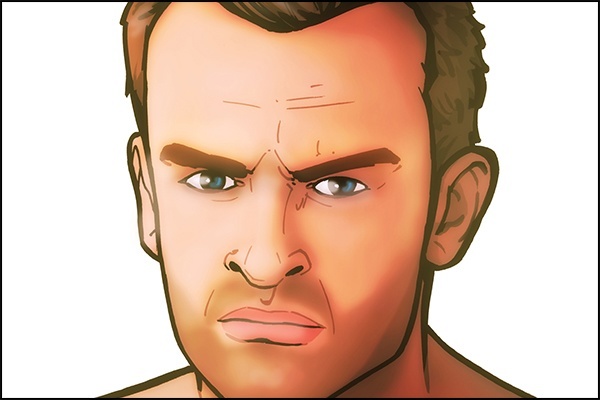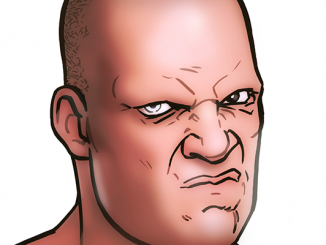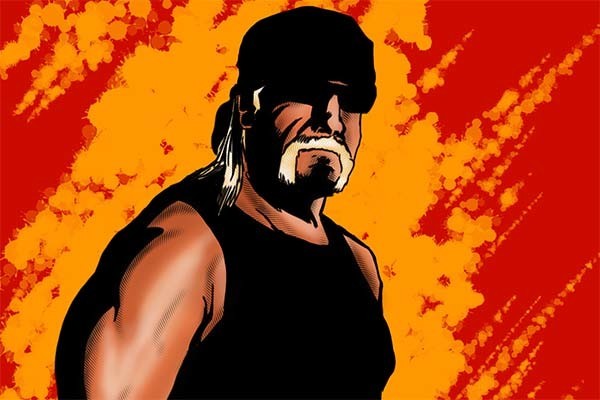
SPOTLIGHTED PODCAST ALERT (YOUR ARTICLE BEGINS A FEW INCHES DOWN)...
The following is an exclusive Q&A with former TNA Impact World Champion Magnus, real name Nick Aldis, discussing a few key topics on TNA Impact Wrestling, including his thoughts on their future, Dixie Carter’s leadership, changes over the years with the product philsophy, and the loss of their key UK TV clearance. The interview was conducted by PWTorch editor Wade Keller on Nov. 10.
Wade Keller: When it comes to your former home promotion, do you find yourself rooting for TNA, against TNA, or just disconnected or indifferent at this point?
Magnus: I’m probably closer to the third choice as far as being somewhat indifferent. I certainly don’t have any bitterness and certainly don’t have any desire for them to fail. That would be completely unforgivable in my opinion, especially considering so many of my friends are still, and helping to run the company. I’ve made no bones about the fact that I’ve always had a very good relationship with Bob Ryder who doesn’t get nearly the credit he deserves for keeping that company going.
I’ve always been very grateful to Dixie, although our relationship certainly suffered towards the end of my time there because she was sort of encouraged to stay out of everything and distance herself from the talent. So suffered isn’t perhaps the right word, but it diminished a little bit. As far as Billy Corgan goes, Billy just started with TNA maybe a couple of weeks before I finished up. My relationship with him was very very short, but fine, very positive.
I honestly have no idea what the hell is going on and how things have got to the point they’re at, but the sad truth is they had a very fragile business model which is very apparent at this point. They were like a law firm that has one big client. Unfortunately, that was essentially where they were at. The Spike contract accounted for such a monumental portion of their income and revenue so the model they established couldn’t be sustained without that revenue stream.
In some ways, I think where they’re at now is a culmination of all of the decision that were made over the last ten years. That’s why if you were to have Joe on here or Bobby Roode or Eric Young or A.J. (Styles) – A.J. was very vocal when he left with is frustrations. But I think overall you’d probably have the same opinion which is they don’t want it to fail, but they don’t have a lot of sympathy. The things they’re suffering, it’s not like nobody was warning them about this stuff. It’s just unfortunate. The buck does stop with the boss. You can point at different people and certainly there have been different influences that have come in over the years that were perhaps not serving the best interests of the company’s prosperity, but ultimately there’s one person in charge.
I think that where they’re at right now is indicative of the constant area of frustration for a lot of the talent which is always suffering an identity crisis. Did it want to be like WWE where it had a huge touring schedule and massive TV presence and was licensing and merchandising and all of this incredible infrastructure like WWE has, or does it want to be just a TV company like Eric Bischoff’s business model that was applied to WCW in the ‘90s then grew to what it was.
It seemed to be there was a tug of war going on in terms of the people running the company. They couldn’t decide which one of those they wanted to be. The smart people, or at least the pragmatic people, were certainly pulling for more of a diverse set of revenue streams, which obviously gives you more stability. Then the ego and the short-term gains mentality of some of the other people just forced everything to always be about TV. I think unfortunately that relationship with Spike deteriorated and Spike were probably well and truly aware of how fragile their business model so, so they called their bluff and said, ‘We’re going to move on.’
Keller: What’s your opinion on Dixie Carter’s leadership?
Magnus: It’s very indulgent to sit here and say ‘If I was in charge, this is what I would do.’ It’s very easy to stay that stuff, just like it’s easy to make observations of someone who has so many responsibilities as the President of a company that size without really first understanding what they have to do on a day to day basis. But my personal observations of Dixie was the positives she brought to the table is she was very ambitious. She always had a big sort of vision. Whether or not some of that was about her wanting some spotlight as well as the company, and I would hear that a lot, and I would always make the point to those who brought that up – who cares? If her ego is what’s driving her to push for this and go live and go on the road and do this or this, sometimes it doesn’t matter what the motivation is because the result is maybe this company will grow and we grow with it. You need a little bit of ego to be in this business for sure.
To me, my biggest frustration with Dixie was always that she would flip flop. She would change her mind. A lot of the time it seemed like decisions were made based on the last conversation she had, a little too easily influenced, which at times was frustrating because I always felt that the shift away from growth and toward decline happened post-Eric (Bischoff) and Hulk (Hogan). I’m not blaming them for it because I like Eric a lot and obviously Hulk is the biggest thing in the business ever. But unfortunately what happened there is by making so many changes, there were so many resets, it just kept creating this culture of try something, that’s not working, try something else, reset. We lost loyalty. They lost brand loyalty.
There were people, and they didn’t realize it until they lost them, but back in the day they were averaging a 1.2 or 1.3 on Spike and pretty soon after all the changes and resets, it started averaging out to a 1.0. That tells me those three points of people who were loyal to just TNA and for whatever reason decided this was pro wrestling they were going to watch and they weren’t necessarily watching WWE – maybe. I always felt like the general opinion in the office is that everyone who is watching our show is also watching WWE. It seemed, and I personally believed, there was a small portion – not a big one – of our audience at that time that were actually just watching us. It was almost like it was one time when they needed a little confidence in themselves, a little ego, but they couldn’t fathom the idea that people were just watching their show and not their show as a supplement to their WWE viewing. I think we lost those in around 2010, 2011 era and never got them back. Then slowly but surely, I certainly don’t mean this to be combative in any way, but I want to make sure I don’t do any more damage to my reputation with WWE than I already have apparently, but I certainly remember being in TNA and making – I don’t know whether there was a chance for me to go to WWE around the time I signed with TNA – probably not – but I can say I was approached and had to say “I’m actually under contract.”
One of the things I remember thinking, trying to be pragmatic about my career, I looked at the rosters and said, ‘Here I get to work with Kurt Angle, A.J. Styles, Samoa Joe, Doug Williams, Christopher Daniels, the Machine Guns, Jay Lethal – a phenomenal talent roster. I was thrown into the deep end which WWE would have never done with me, and rightfully so. They wouldn’t expose a guy who needed some fine tuning. But because I was afforded the opportunity to not only work with all of those names I just mentioned, but also sit under the learning tree of Kevin Nash and Scott Steiner and Booker T and Mick Foley and Sting. Sting, I can’t say enough about how much help Sting was to my career in terms of advice and influence.
I could be wrong about this, and I’m sure one of your Poindexters there would be happy to point it out if it’s not correct, but I believe there are only two people who have a submission victory over Sting – and it’s me and Bret Hart. Anyone who understands how the business works when you are somebody like Sting knows there is one guy who makes that call. But that just shows you the amount of endorsement I got from him. I remember thinking at that time this is the best place for me at 22 or 23 years old, that I was at that time. I remember thinking this is the best place for me. Here I get to work with all of these guys and being on television. I’ve always been one of those people where when it comes to sports, if you throw me in the deep end with something, I’ll pick it up. My ego and my pride don’t allow me to not step up to that level.
Again, going back to the UK, that was another thing I felt like one of the reasons we had such a strong presence in the UK is because the UK saw that roster and said, ‘These guys are awesome.’ They didn’t have the same mentality in terms of what Americans do in terms of what’s the brand, do I know what the brand is, I don’t know what the brand is, it’s not cool. There wasn’t as much as of that going on in the UK. They were just ‘I like this guy, I like that guy, and wow have you seen that Beer Money, they’re awesome. Samoa Joe is kicking ass and A.J. Styles is so great and blah blah blah. People in the UK made the choice because they were a bit more open-minded to the strength of the brand and I think the one thing TNA lost, unfortunately, was that brand loyalty and that brand strength that they once had.
Keller: Being familiar with UK television, compare the Challenge TV Network in the U.K. that TNA was on for years to perhaps a U.S. channel that fans in the United States are familiar with?
Magnus: Challenge wasn’t a huge channel in the UK, but it’s got a lot of history. It’s basically like Game Show Network over here. All the shows on there were game shows, hence the name. It would be Ninja Warrior or things of that nature. It was the whole nature of the channel. It was part of the Sky platform, part of the Sky family of channels, so they are able to acquire a lot of high quality content and they have a very favorable positions in the TV guides, which is a huge thing. People will hear this and say no way, Spike TV had way more viewers, but in terms of the population and I guess the percentage of the people if you did it that way in terms of share, it wasn’t that far off from what Spike was.
Keller: Do you think TNA will end up on another channel in the U.K. or did you look at Challenge TV as this was their one shot to be on a decent network in U.K.?
I don’t think that’s the case at all. I can’t speak to that right now, but I dare say – I could be wrong about this – the peak viewership for TNA was around the 2012-2013 time. I dare say that at that point, had their contract been up for renewal at that point, they might have been in a pretty favorable position, especially considering that now Spike TV has a UK channel, there is a Spike UK now. There’s a lot of depth to the television channels in the UK just like there is here, so I dare say they could end up somewhere, but in terms of revenue, it’s certainly not the same ballpark when it comes to the U.S. People don’t have any idea how much money there is in American television compared to commercial U.K. television or really anywhere else for that matter because of the population.
NOW LISTEN TO THE FULL INTERVIEW INCLUDING THIS TOPIC AND MANY MORE HERE.
OR CHECK OUT THE PREVIOUS INTERVIEW HIGHLIGHTS WITH CODY RHODES HERE: Interview Highlights: Cody Rhodes talks about his ROH debut tomorrow night, life after WWE, why he left, more (w/Keller’s Analysis)




Where is Magbnus nowadays? He disappeared from the wrestling landscape.
He’s the “Global Force Champion” These websites eek him out for interviews bc his career has gone nowhere after leaving TNA and he is desperate for relevancy
Disagree with Magnus. If he thinks Bischoff and Hogan helped TNA and didn’t hurt their growth, he’s crazy.
Well, he did leave TNA for the non existent Global Force Wrestling based soley on the word of jeff Jarrett that “it was gonna be big”.
Great interview. Very honest about the problems at TNA and where to point the finger. We watched TNA for seven years but when Corgan was not given ownership, decided to urinate on anything related to the company.